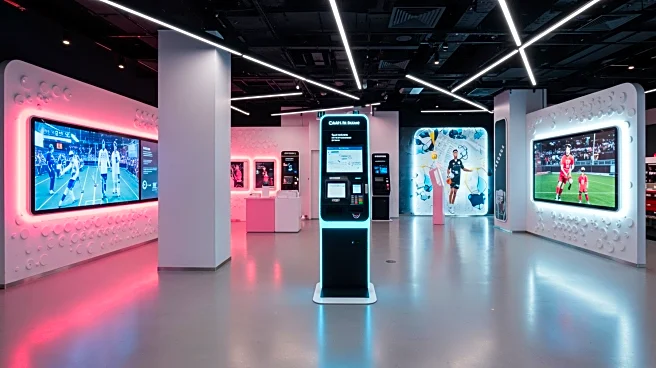What's Happening?
Retailers are increasingly adopting experiential commerce strategies to enhance consumer engagement and drive transactions. This approach involves creating immersive and interactive experiences that go beyond traditional shopping, aiming to inspire consumers and foster emotional connections. Brands are utilizing interactive displays, immersive product demos, and personalized encounters to stand out in a crowded market. The focus is on creating meaningful experiences that resonate with consumers, encouraging them to engage with the brand and ultimately make purchases.
Why It's Important?
Experiential commerce represents a significant shift in retail strategy, emphasizing the importance of consumer experience in driving sales. By creating engaging and memorable interactions, brands can differentiate themselves from competitors and build stronger relationships with consumers. This approach not only enhances brand loyalty but also increases the likelihood of conversion, as consumers are more inclined to purchase from brands that offer unique and personalized experiences. As digital fatigue grows, experiential commerce provides a way for retailers to capture consumer attention and drive meaningful engagement.
What's Next?
Retailers are expected to continue investing in experiential commerce, exploring new ways to integrate immersive experiences into their marketing strategies. This may involve leveraging technology such as virtual reality and augmented reality to create even more engaging interactions. Brands will likely focus on optimizing their presence across various channels, including physical stores, digital platforms, and social media, to create a cohesive and impactful consumer journey. As experiential commerce evolves, retailers will need to adapt and innovate to meet changing consumer expectations and maintain a competitive edge.
Beyond the Headlines
The rise of experiential commerce highlights the growing importance of emotional connection in consumer behavior. By prioritizing experiences over transactions, brands can foster deeper relationships with consumers, leading to increased brand loyalty and advocacy. This shift also underscores the need for retailers to understand and cater to the evolving preferences of consumers, who are increasingly seeking meaningful and personalized interactions. As experiential commerce becomes more prevalent, it may also influence broader trends in marketing and consumer engagement, shaping the future of retail.









